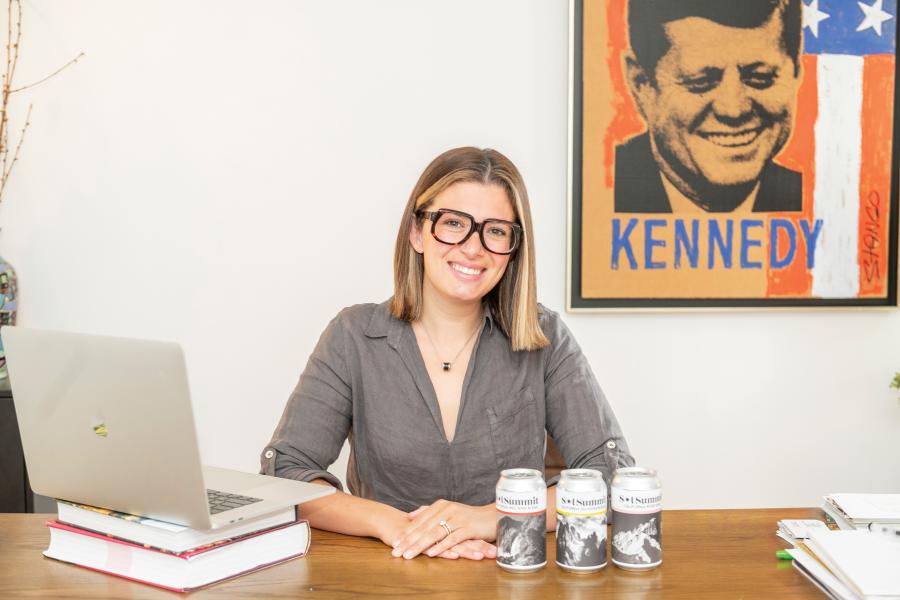Emily Dabish Yahkind, A&S '16 (MA), got the idea for her business, SolSummit, on the trails. Dabish Yahkind and her husband are avid runners and hikers, and they would often pack canned beer for their adventures. But Dabish Yahkind, who previously worked in public policy, had always loved wine. In fact, while she was completing her graduate degree, she spent many of her evenings working at a local wine shop. So when she couldn't find a high-quality, sustainable canned wine product to enjoy while soaking in the scenery, she decided to make it herself.
These days, Dabish Yahkind, SolSummit's founder and chief wine lady—yes, that's actually her title—distributes both bottled and canned wine, including pinot noirs, sauvignon blancs, rosés, and red blends. Here she explains how she handles the ups and downs of entrepreneurship in the increasingly crowded field of sustainable beverages.
How did you feel when SolSummit launched?
SolSummit, online at solsummitwine.com, took about three years to develop. I wanted to create a product that could appeal to both men and women without feeling gimmicky, with a sense of place associated with it. It had to be easy to understand and easy to enjoy!
We officially launched in July 2023. Since then, we've grown sales to six states—Maryland, Virginia, Delaware, Colorado, Michigan, and New York—and D.C. The launch was surreal: I remember the first time my husband saw a SolSummit can on the shelf of a wine shop. He took a photo of it and sent it to me, and it was the most invigorating feeling to know that I was able to create something that was being shared not just with my family and friends but with people I didn't even know. It was an overwhelming joy!
What keeps you in entrepreneurship and business ownership?
I love interacting with people during demonstrations in stores and seeing them get excited about SolSummit. When people are excited and become loyal to the business, there's so much consistency and reliability. It's also been really incredible to expand to other states. I've been able to visit beautiful places that fit the ethos of our brand. Recently I was in Colorado, visiting towns like Aspen and Vail, and it was amazing to see that one of our best stores in Colorado is at the base of a gondola in Vail. The mountain experience is reflected in our story and on our labels.
Tell us about the wine itself. Where is it grown? How did you choose this particular varietal?
We work with a family vineyard in Clarksburg, California. The family has lived there since the 1860s, and everything we create is vegan friendly, certified sustainable, and certified green. The vineyard is nestled between the Mayacamas Mountains and the Sierra Nevadas. You can see those ranges from the base of the vineyard, and those are the ranges on the labels, too. It took a significant amount of research and tasting to find the right partner vineyard.
What's the most challenging part of working in the wine industry?
There's a lot of red tape—tons of permits, applications, and unique rules for each state. That can hold up projects and make it hard to move our products into new states. And because wine goes vintage by vintage, the grapes only come through once per year. That makes it difficult to anticipate production, especially as you're growing a new brand!
Tell me about your values of sustainability. Why does this matter to you?
I care about how we treat the Earth, and most people who enjoy SolSummit products are outdoor enthusiasts, so this product is aligned with their values. We indicate on the bottles and cans that this is a certified sustainable, green product, and my hope is that this tells people they are getting a premium product that they can feel good about enjoying. For us, sustainability reflects the irrigation practices we use in the vineyard and the fact that we don't use any herbicides or pesticides. We also use cover crops to preserve the land and maintain the local agricultural ecosystem.
What advice would you give to other people who want to start businesses?
Use the skills that come naturally to you. I had a good base knowledge of wine and a background in public policy, which played well together to form this brand. So go after your passion, but play to your strengths, too. Ask yourself: What makes your toolkit unique?
Posted in Alumni
Tagged entrepreneurship








